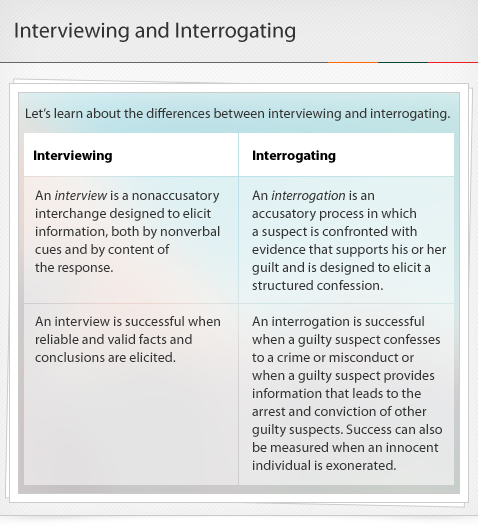Module 1 Assignment 2
Before we can consider the roles of an interviewer and an interrogator, we must look at the important differences between the interviewing and the interrogation processes. An interview is a means to get investigative leads from victims or witnesses; the objective of an interview is not to arrest or charge anyone with a crime but to gather information about a crime. However, an interrogation conducted in the civilian law enforcement sector is a means, through Miranda rights, to gain a confession from the perpetrator of a crime. A military interrogation is a custodial interrogation through the Manual for Courts-Martial. The purpose of interrogation in the military is to gain tactical information or information about a crime committed by the perpetrator.
Interviews
Forensic psychology professionals conduct interviews for a variety of reasons. In forensic work, we may want to answer a psycholegal question such as competency to stand trial or criminal responsibility. In a therapeutic setting, we may conduct an interview in order to develop treatment plans for an inmate or a probationer. Or in the case of a criminal investigation, the forensic psychologist might interview a victim, an eyewitness, or even a suspect. However, the key in all three cases is that the sole purpose of the interview is to collect information.
Another benefit of forensic psychologists or professionals conducting these kinds of interviews is that their training provides the tools needed to not only encourage the collection of accurate information but also identify when the interview is providing false information. For example, someone hoping to be found not guilty by reason of insanity (NGRI) may feign or exaggerate symptoms of a mental illness. An inmate or probationer may be reluctant to disclose prior criminal behaviors or criminal intentions. Or, on the other hand, a law enforcement officer may minimize his or her distress in a fitness-for-duty evaluation so as to remain on active duty. The forensic psychology professional must be cognizant of these possibilities. However, as a forensic psychology professional, you should not use deceptive tactics or coercion to obtain information.
Interrogations
Interrogations are very different from interviews in a variety of ways. First, forensic psychology professionals do not conduct interrogations because it is not in their purview to establish guilt or innocence or determine whether someone has broken the law. These are the responsibilities of law or military enforcement officers. In an interrogation, the interviewer assumes that the person being interrogated is guilty or has valuable information. The interrogator may assume that the individual will not admit his or her guilt or disclose the information, and it is the interrogator's job to use all techniques at his or her disposal to get the party to confess. Interrogators in law enforcement can lie to the suspect. For example, they may tell the suspect that they have an eyewitness who saw the suspect commit the crime, when in reality there is no witness. They can suggest that an accomplice has already confessed and has put the entire blame on the suspect. They can minimize the crime, even suggesting that they will not arrest the person once he or she confesses. The interrogator can play the role of a friend or confidant, suggesting that he or she too would have done the same thing had he or she been in the situation. Or, the interrogator may threaten and badger the suspect, depriving him or her of sleep and creating an uncomfortable physical environment. Due to these reasons, a forensic psychologist, who is bound by the APA code of ethics, cannot take on the role of an interrogator.

In this module, you will start a session-long project of interviewing a person who may be at risk of injuring others. No crime has been committed. You will interview the individual, not to prove that he or she is dangerous but to make an assessment of his or her risk in the workplace. You are obligated as an evaluator to tell the person why you are interviewing him or her and how you intend to communicate your conclusions to others. You can proceed only when you are sure that the person understands the potential implications of the interview.



